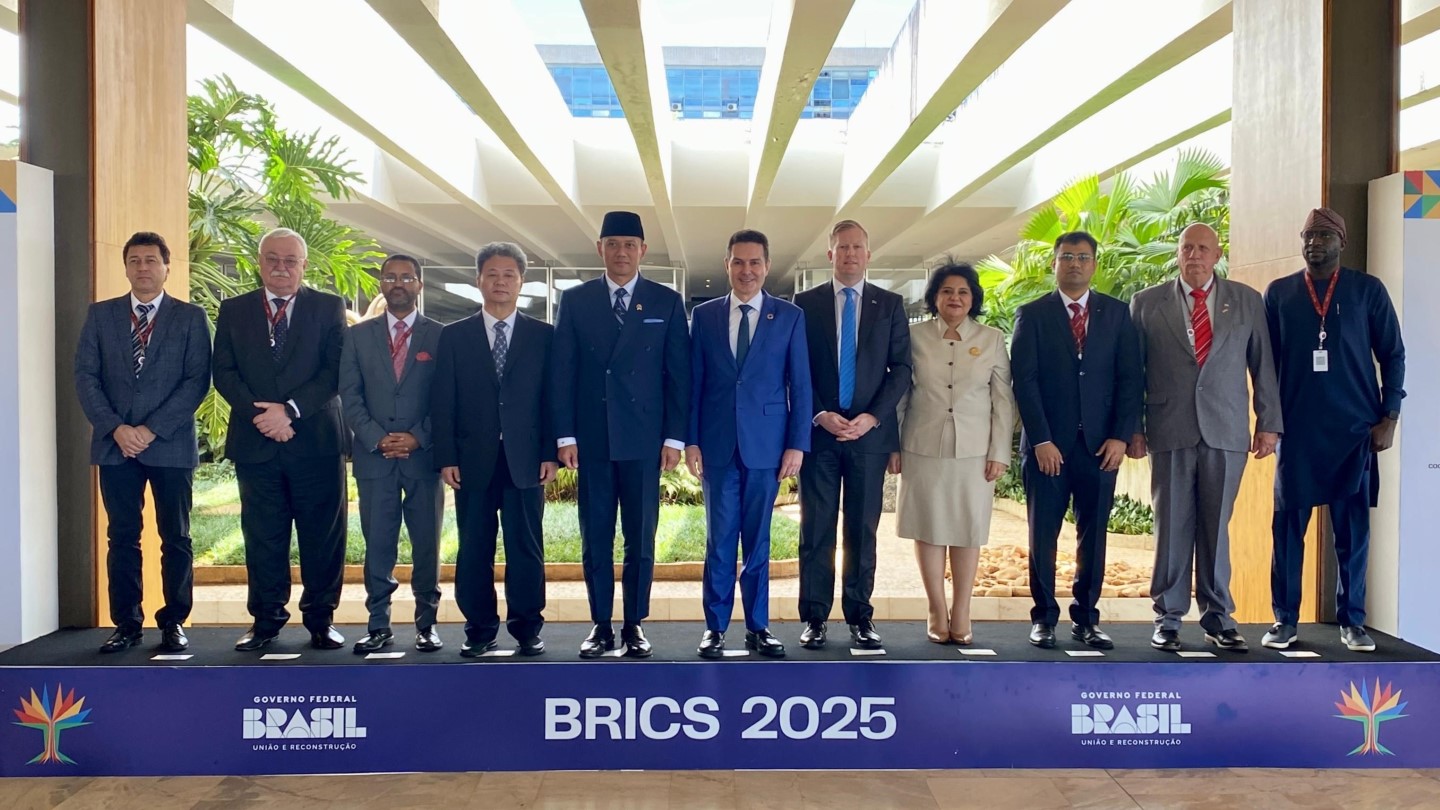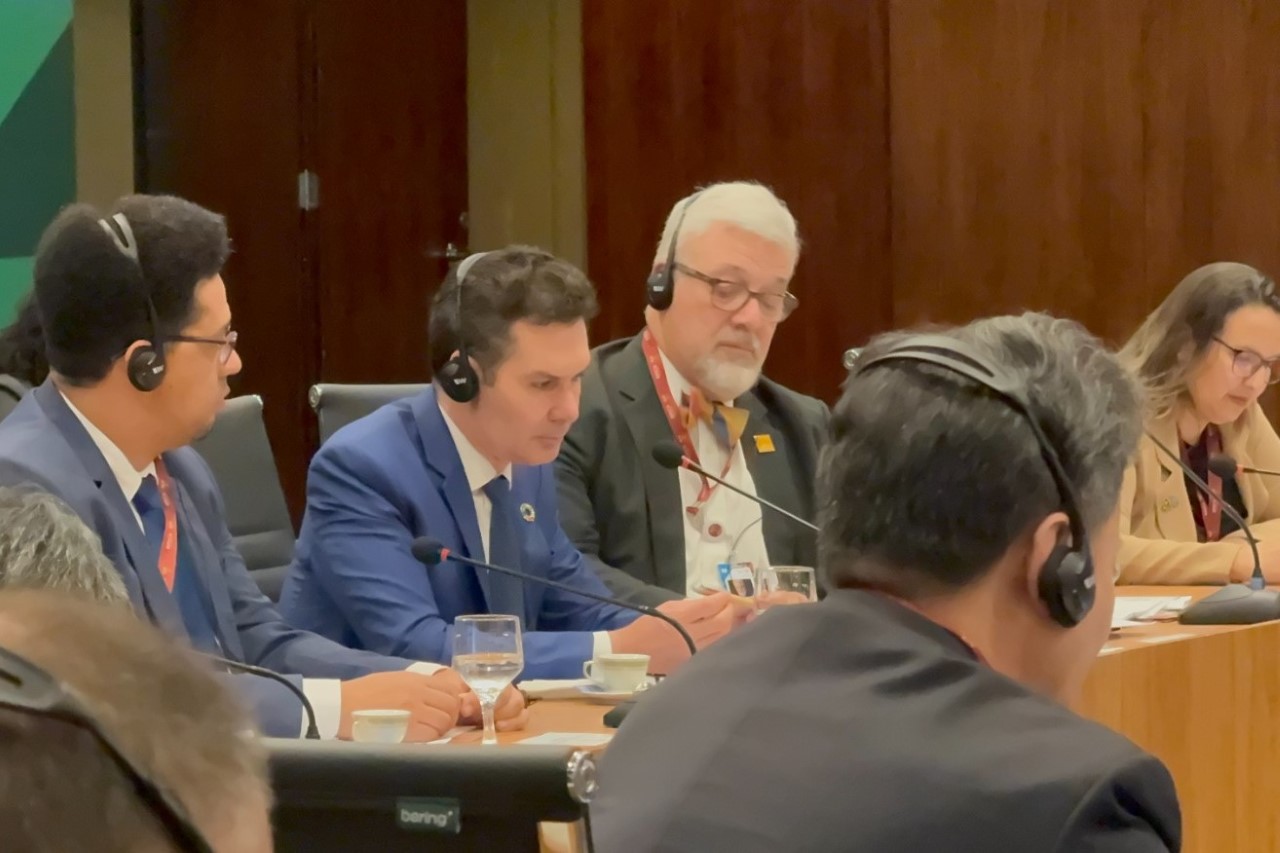"There is no climate justice without urban and social justice," says Minister Jader Barbalho Filho during BRICS meeting
Ministers discuss sustainable urbanization, housing, and climate finance during forum in Brasilia

By Maiva D’Auria | BRICS Brasil
“There is no climate justice without urban and social justice.” With that statement, Brasil’s Minister of Cities, Jader Barbalho Filho, opened the BRICS Urbanization Forum on Monday (June 23) at the Itamaraty Palace in Brasilia. Throughout the meeting, ministers reaffirmed their political commitment to advancing a multilevel governance model to develop more inclusive, resilient, and sustainable cities—focused on reducing social inequalities and disaster risk.
In his opening remarks, Minister Jader Barbalho Filho underscored the urgency of tackling the challenges posed by climate change, unplanned urban expansion, and rising social inequality in cities.
“This is a political affirmation: cities must be at the forefront of the global response to the climate crisis, social inequality, and the challenges of sustainable development. Let me put it bluntly: there is no climate justice without urban and social justice,” said the minister. Citing the direct impacts of the climate crisis on Brazilian cities, particularly in the Amazon, Minister Barbalho Filho added:
“In the Amazon, for instance, people live in cities, in urban areas. Floods, heat waves, housing deficits, poor sanitation, and disaster risk all weigh most heavily on the urban areas where the most vulnerable populations live. That is why we are building — and hope to share with BRICS — a strategy for urban development that places cities at the center of climate action. The Brazilian presidency of BRICS has endeavored to bring the urban agenda to the forefront as a key strategy in addressing the climate crisis and inequality.”

Three thematic pillars for fairer, more resilient cities
Over the course of the day, ministers and representatives from BRICS member and partner countries participated in three thematic sessions addressing the main urban challenges faced by the group.
Housing and the Urban Agenda: Strategic Priorities in the Face of the Global Climate Crisis
The first panel focused on strategies to scale up public policy for social housing, aimed at reducing urban inequality and vulnerability. Discussions covered alternative models of housing provision, mechanisms to mobilize public resources, promotion of public-private partnerships, and the design of financing programs for housing improvements.
Indicators for Evaluating the Sustainability of Public Investments
The second panel addressed the development of indicators to assess the sustainability of public investments in cities, aligning with the 2030 Agenda, the Paris Agreement, the Sendai Framework, and the New Urban Agenda. The discussion aimed to identify the main challenges and opportunities for mobilizing resources toward sustainable urban development and climate resilience.
Financing Urban Climate Resilience – Infrastructure and Urban Services
The third panel focused on solutions to expand climate-resilient urban infrastructure and services in BRICS countries, with special attention to vulnerable communities. The conversation explored innovative financing and governance models, emphasizing the combination of public and private resources to promote inclusion and sustainability in cities.
Participation of partner countries
The forum brought together official BRICS member countries—Brasil, Russia, India, China, South Africa, Egypt, Ethiopia, and Indonesia (which joined the group in January 2025)—along with partner countries Cuba, Bolivia, and Nigeria, currently invited as cooperation partners to the bloc.
Raul Omar Acosta Gregorich, President of Cuba’s National Institute for Territorial and Urban Planning (Inotu), emphasized the significance of Cuba’s participation in the forum. “It is, first and foremost, an honor for us to be a partner country of BRICS, given the significance of the group for the global economy and for the economic development of all its member states. Furthermore, this partnership is of strategic importance as it enables cooperation and engagement with all nations comprising the group, particularly in a domain as critical as urban development,” stated Gregorich
He also noted Cuba’s expertise in urban planning and housing, despite the country’s challenges. “We face many development-related issues, but we have also built valuable experience and have a highly professional team. We have cooperated with more than 30 countries across Latin America, Africa, and Asia. We are ready to share our experience—and to learn from other BRICS countries as well,” he said.
Among Cuba’s top urban priorities, Gregorich highlighted housing, particularly the urgent need to reduce the housing deficit. “We are currently facing a shortfall of over half a million housing units. We are implementing an intervention program to improve substandard neighborhoods and eliminate housing precarity. Although we have the lowest rate of urban precarity in Latin America—5.7%— we are striving to meet the UN target of reducing this rate to 3% by 2030.”
Gregorich concluded by emphasizing the importance of international cooperation: “I believe countries in the Global South have a powerful asset: a wealth of experience. If we combine our efforts and cooperate, we can achieve great things. That is the value we place on our participation as a BRICS partner country.”
English version by: Tadeu Azevedo (POET/UFC)
Proofreading by: Michel Emmanuel Félix François (UFC)